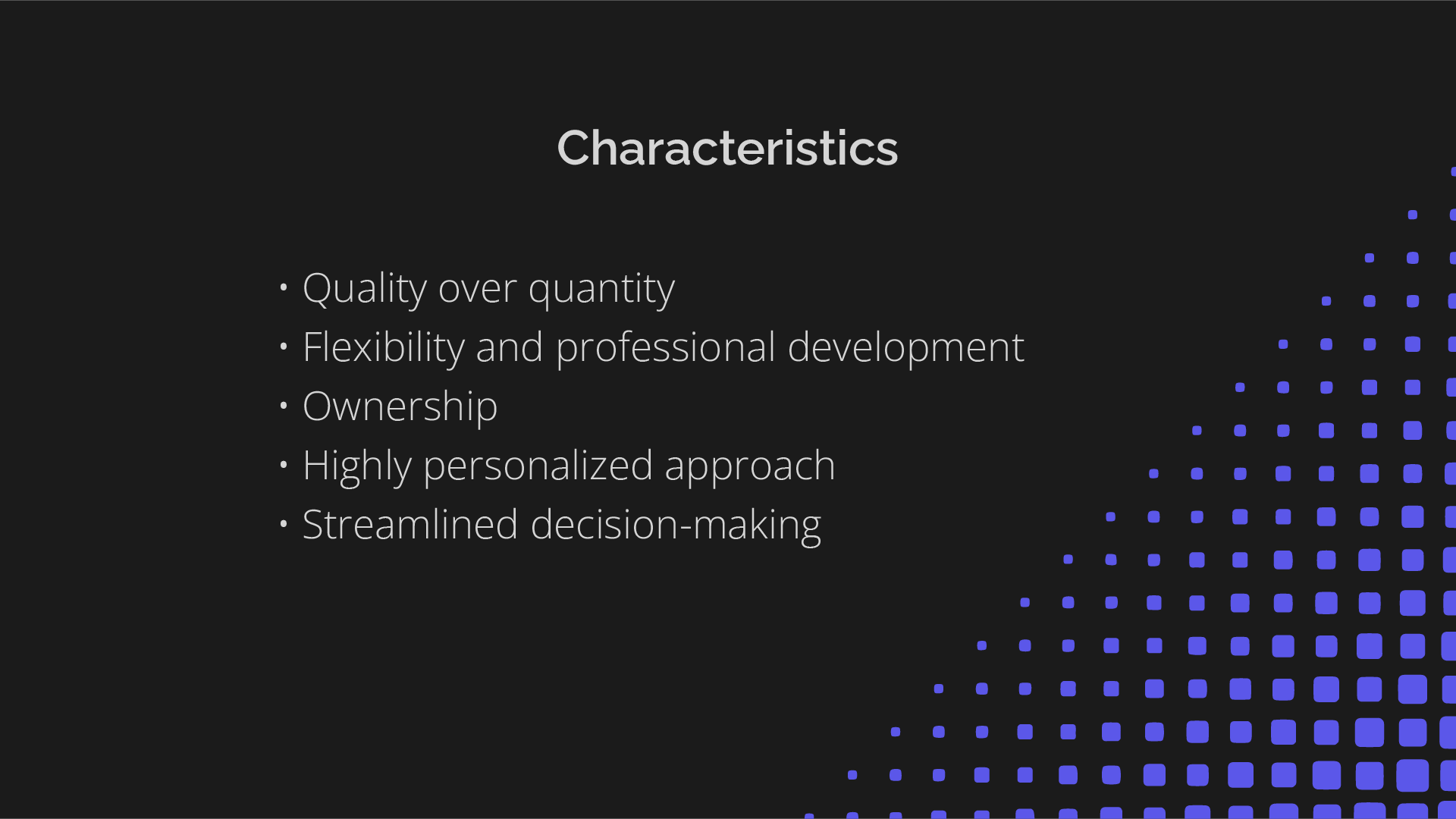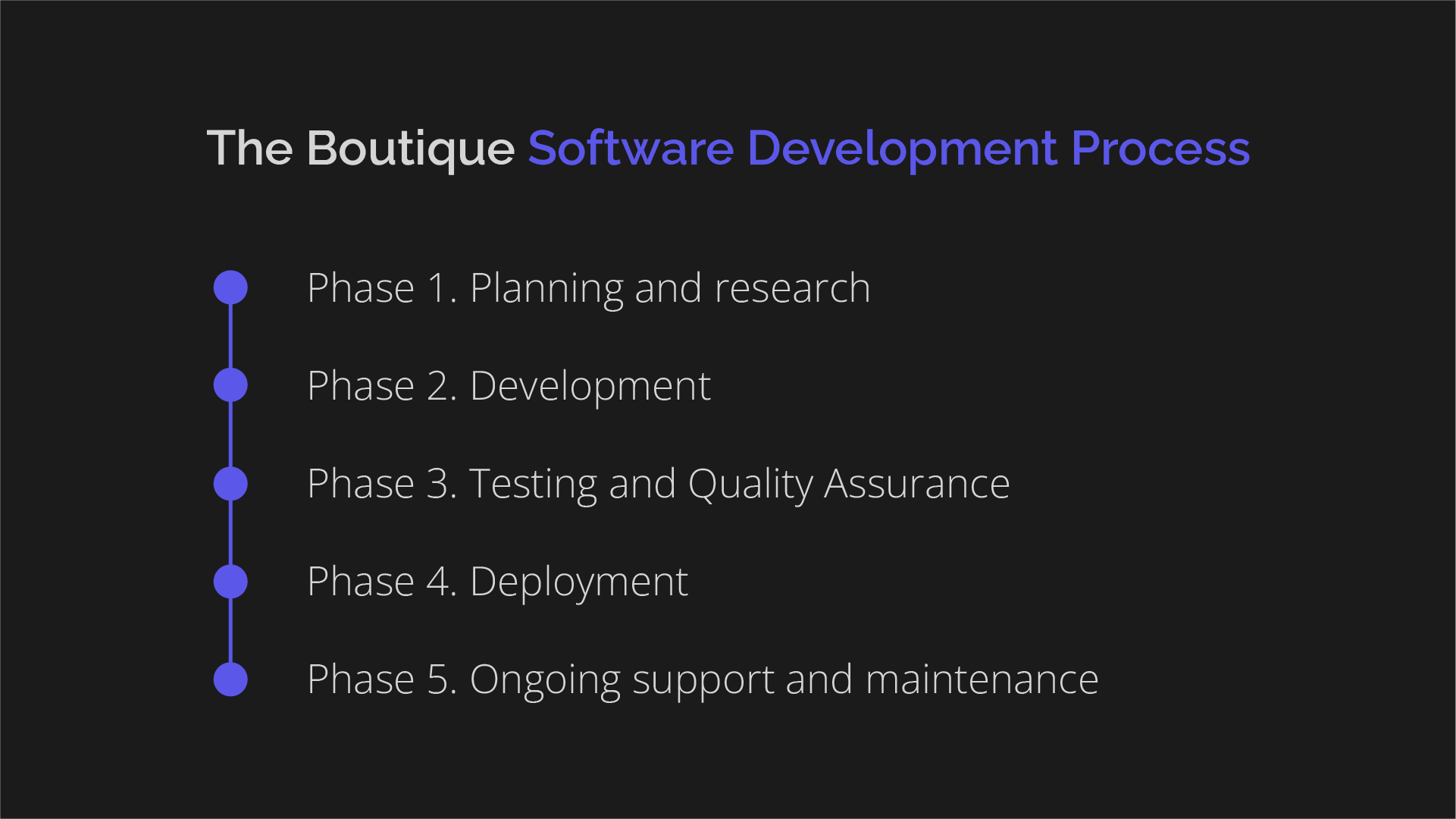
Developing flexible, scalable, and reliable software solutions is fundamental to the long-term success of most organizations today, regardless of industry, size, or focus. Transitioning from internal systems for data processing to sleek and efficient client-facing software applications requires organizations to not only transform their business operations but also be able to adapt and respond to changes quickly.
With this in mind, approaches to software development change along with the evolution of the market. Today's hottest trends will fade, and innovative new approaches will emerge. The only attribute which can be effectively leveraged over time is your unique business perspective and your trusted relationships with your clients. For this reason, it is best to seek out a strategic partner who takes a boutique approach to software development.
In this article, we will delve into the intricacies of this approach. We will take a look at its key features and benefits and find out why it is the best choice for businesses looking to thrive in the digital age.
What Is a Boutique Approach to Software Development?
Imagine that you need to buy a shirt that perfectly fits your personal measurements, with specific fabric, color, accessories, and so on. Naturally, you wouldn't search for it on the shelves of a mass-market store. Instead, you would seek out a skilled tailor who can take your measurements, assist in selecting the ideal fabric and color, offer style recommendations, and meticulously note all your preferences.
A boutique approach to software development is your tailor with extensive experience and continuously improving expertise. It involves giving special attention to the client's ideas and requirements and crafting exceptional software solutions that precisely align with your business's unique needs. Unlike one-size-fits-all solutions (e.g., mass market), boutique software development emphasizes exclusivity, individuality, and meticulous attention to detail.
Why is a Boutique Approach the Key to Success?
The digital world is always evolving, driven by the constant need for progress. The basis of success in this dynamic environment depends on the ability to adapt swiftly to rapidly changing conditions.
This is why off-the-shelf, mass-produced code solutions no longer suffice in an era where every industry is gravitating toward personalized offerings and customer-centric business models. It's only through the creation of custom products tailored to meet the precise needs of users have the future.
Partners using a boutique approach typically have experience in developing complex, high-functional, data-driven, scalable, and adaptable products. They continuously enrich their expertise by adopting diverse industry practices and mastering new technologies, thus fostering innovation for their clients.
Whether they're designers, developers, business analysts, or security engineers, they are well-versed professionals. And the boutique approach itself is inherently flexible and readily adaptable to meet specific requirements.
Furthermore, the boutique approach is about close personal interaction with clients to ensure that the team's approach matches the philosophy and culture of the client company. It also allows you to respond quickly to changing needs, ensuring transparent communication.
5 Key Characteristics of Boutique Software Development

Quality over quantity
The digital market is such that most large-scale development companies are primarily motivated by meeting quotas and releasing code on a massive scale. They mainly focus on metrics such as revenue numbers and billable headcounts, whereas the boutique approach is about meeting clients' goals first and building solutions according to specific business needs. This unwavering dedication to quality extends across all phases of the project, from its initial concept to the delivery of the final product.
Teams can provide personalized attention to each client engagement, fostering close collaboration to understand specific needs, objectives, and goals thoroughly. They have time for careful planning, comprehensive research, and proactive problem-solving. A flexible approach, in turn, allows continuous improvement and iterative development.
Quality assurance is the cornerstone of boutique software development. At various stages of development, rigorous testing procedures are used to identify and fix any problems quickly. This helps eliminate bugs, security vulnerabilities, and performance bottlenecks, resulting in reliable and efficient software.
In addition, the philosophy of this approach involves seeing developers as craftsmen, proud of their work, and personally invested in the project's success. This intrinsic motivation fosters a culture of excellence, where every line of code is scrutinized and reviewed to ensure it meets the highest standards.
Flexibility and investment in employees' professional development
The problem is that many large corporations may be unable or unwilling to invest sufficient resources in the professional development of their employees. This deficiency inevitably impacts the quality of their work and delivery of the product.
For example, the same product with a standard set of features and capabilities can be created for different clients with completely different business needs. And the reason for this is not only the standardized approach to software development; it's also influenced by the unchanging skill sets of engineers, finely tuned for standard processes.
This is where the boutique approach emerges as notably more adaptable. Such companies allocate resources toward fostering the professional growth of their employees and prioritize the uniqueness of each client. Thus, engineers constantly develop their expertise and use it to create scalable, innovative, and perfectly and precisely tailored solutions for individual clients and their unique challenges.
Ownership
In large companies, projects can pass through many hands, so clients don't know who is responsible for the result. Boutique teams, instead, foster a strong sense of ownership right from the start.
Boutique developers see their work as personal responsibility. They are responsible for the entire project life cycle, from start to finish. This sense of ownership ensures a high level of reliability and commitment, as developers are eager to see the success of their creations.
Finally, ownership includes a commitment to continuous improvement. Boutique teams strive to improve their skills, processes, and tools, resulting in a constant pursuit of innovation and excellence.
Essentially, ownership is a feature of the boutique approach, ensuring that each project receives individual care, dedication, and commitment to deliver the best possible results for both the client and the development team.
Highly personalized approach
The ability to provide a personal touch to each project stands out as a defining feature. This unique characteristic ensures that your project receives exceptional attention. In contrast to larger companies, where your project might risk being sidelined, boutique software businesses prioritize individual clients.
With a smaller client base, they can fully devote themselves to understanding your needs and objectives, treating each client with respect and significance. This dedication means you can expect a level of personalized attention and commitment, as well as a tailored experience that sets boutique companies apart in a tech industry often dominated by larger players.
Streamlined decision-making and fewer layers of management
Large corporations have numerous tiers of management and complex hierarchies. Boutique firms maintain a more cohesive and close-knit team, creating direct and dedicated contact for clients.
How does this affect the development of custom solutions?
- Simplified decision-making. Fewer layers of management, as well as the absence of bureaucratic obstacles and numerous protocols, mean a more streamlined structure that facilitates faster decision-making.
- Direct and committed assistance. Clients benefit from immediate assistance as they can access project managers and team members easily. This direct contact improves communication and collaboration, ensuring customer needs are met promptly and efficiently.
- Flexibility and adaptability in decision-making. With fewer bureaucratic hurdles, boutique software development companies can reorganize and adjust more quickly in response to changing project requirements or unforeseen issues.
- Effective project tracking. Project managers with specific areas of responsibility can closely monitor progress and, if necessary, make immediate adjustments to the project strategy. This real-time tracking and intervention ensure that the project remains aligned with its goals and objectives, increasing overall project success.
So, as you can see, fewer layers of management in boutique software development facilitate faster decision-making and direct customer engagement.
The Main Advantages of the Boutique Approach

The boutique approach to software development has many advantages. We will take a closer look at the main ones.
- Quality and accuracy of coding. At the heart of boutique software development is an unwavering commitment to quality, which is why every line of code is carefully crafted and reviewed.
- Client-oriented philosophy. This approach puts the client at the center of every project. Developers take the time to understand a client's unique needs, goals, and objectives. Therefore, the solution is not just functional but also specially created to solve specific problems.
- Flexibility and adaptability. Boutique teams are agile and adaptive by nature. They avoid the rigid structures often found in large organizations, allowing them to change quickly to meet changing project requirements.
- Improved collaboration and transparent communication. Boutique firms develop a culture of close cooperation and open communication. Clients have direct access to project managers and developers, providing real-time feedback and discussions.
- Greater accountability and responsibility. Such teams, as a rule, take more responsibility for their projects. This increased sense of ownership means that clients can expect a higher level of dedication and commitment throughout the development process.
- A wide pool of exceptional talents. Boutique consulting and software development companies often attract top talent, providing the opportunity to work on diverse and complex projects. These skilled professionals are motivated by the pursuit of excellence, contributing to the high-quality products that boutique firms are known for.
- More effective project management. Simplified decision-making processes and the absence of bureaucratic delays ensure that projects are executed with greater efficiency and faster delivery times.
Companies with a boutique approach focus on craftsmanship. The developers personally invest in the project's success, so every aspect of the software is thoroughly researched and reviewed.
Example
Let's consider the difference in approaches with specific examples. Imagine that you need to find specialists to develop a healthcare application. You have clear requirements: it must be easy to use and contain all the necessary functionality for making appointments with doctors, tracking medical history, etc.
Companies with a standard approach, most likely, already have ready-made solutions that have already been adopted by other organizations in your field. This may be a faster and cheaper option. But:
- Your customers' needs are not taken into account because the program is created based on average patient requirements.
- The software is not adaptive and flexible; you do not have opportunities to expand the functionality.
- You offer your customers the same options as your competitors. Why should they choose you?
Here, a team with a boutique approach comes into the picture. First, it will consider every smallest need and requirement (even the non-obvious ones). Second, it will help you create a custom solution for your target audience that will provide your patients and employees with the unique functionality they need.
Moreover, boutique teams are the kings of working with data. They can develop a healthcare app with personalized offers and features, focusing on the needs of a specific user.
As a result, you get a unique solution based on your special needs and offer your customers an exceptional user experience. Plus, your app is flexible, responsive, and highly scalable.
The Boutique Software Development Process: Craftsmanship in Action

As already mentioned, the boutique approach to software development is flexible and adaptable to the client's needs, so it may have various steps. However, in general terms, it consists of the following main phases.
Phase 1. Planning and research
Here, the team begins with in-depth research, namely a thorough study of the client's needs, goals, and industry landscape. Developers take the time to deeply understand the context of the project so that the result is truly highly customized.
At this stage, the team also determines the scope of the project. Specific goals, deliverables, timelines, and budget constraints are set to ensure a clear roadmap. In addition, the team identifies potential problems and risks, creates strategies to mitigate them, and provides the smooth implementation of the project.
Phase 2. Development
The development phase involves creating the software's architecture, design, and code. Boutique developers are passionate craftsmen, and every line of code is carefully crafted to the highest quality standards.
Such teams offer leverage iterative approaches to software development. They divide the whole process into small functional increments and develop, test, and refine them before moving to the next stage. This provides flexibility and adaptability as the project evolves.
It's worth noting that customers stay closely involved with feedback and referrals. The team integrates their ideas into the development process to ensure alignment with their vision.
Phase 3. Testing and Quality Assurance
Comprehensive and rigorous testing is the core of software development. Every aspect of the software is subject to testing, including functionality, performance, security, and usability.
Another important aspect of this stage is dealing with issues or bugs. The specialists find and resolve them immediately. This stage ensures reliable and efficient operation of the software, minimizing surprises after launch.
Also, customer verification is paramount. The customer thoroughly tests the solution to ensure that it meets their requirements and expectations.
Phase 4. Deployment
Before the launch, the software undergoes a final check to ensure it is ready to run. The engineers work on performance optimization and fine-tuning to ensure smooth operation.
They carefully orchestrate deployment to minimize downtime and failures. At this stage, the software becomes available to users, which is the culmination of the development journey.
Phase 5. Ongoing support and maintenance
Boutique companies often do not consider a project complete after deployment because there is still a long way of evolution and change ahead. They provide ongoing support, resolving any issues that may arise and ensuring the software's continued excellence.
As customer needs change, boutique teams are ready to scale the product and make improvements to keep it competitive and meet new industry trends.
At its core, the typical workflow and stages of boutique software development are all about the commitment to accuracy, continuous collaboration with the client, and a responsibility to deliver a solution that meets and often exceeds expectations.
The Future of Boutique Software Development
The boutique software development approach becomes integral as the tech industry evolves rapidly. More and more enterprises need companies of specific specialization because they have all the resources to keep up with all the innovations that appear every day and thus possess all the necessary skills.
So, boutique software development has serious growth potential. Clients are increasingly appreciating the personalized, quality-oriented approach offered by boutique firms. This is especially true for the market, which larger, more impersonal competitors often dominate.
Boutique firms are expanding into new areas such as IoT, AI and ML, cybersecurity, and data analytics, offering clients a broader range of experiences while maintaining their core principles of quality and personalization.
Integration of new technologies
Artificial intelligence and machine learning are finding their way into boutique projects. These technologies extend software capabilities, enabling predictive analytics, natural language processing, and automation. Boutique firms are using AI to deliver innovative, more intuitive solutions.
The security and transparency features of the blockchain are also worth paying attention to. Boutique development teams are exploring its applications in the finance, supply chain, and healthcare sectors. They use blockchain to create tamper-proof records and streamline complex processes.
Cross-industry cooperation
The strategic partnership across industries is one of the most important tech industry areas. Cooperation with industry experts allows boutique companies to develop projects requiring specialized knowledge, ensuring clients receive comprehensive, personalized solutions.
Global scale
Global scale no longer depends on the size of the company and the number of its employees. Technology allows us to work with clients and talent from around the world, fostering diversity and enriching the project experience. And boutique software development is expanding its reach thanks to this.
Sustainable practices
Environmental initiatives are critical, and boutique firms are aware of this. They are actively implementing green practices, such as energy-efficient data centers and reducing carbon emissions, in line with the growing environmental awareness of customers.
The time of a standard faceless approach to customers is almost over. In the future, customized solutions and a boutique approach will play a key role in providing innovative, high-quality solutions. The flexible nature of the development of such companies and their commitment to quality position them as a strong competitor in shaping the technology industry's future.
The Bottom Line
In a world where off-the-shelf, mass-produced code no longer suffices, personalization plays a key role in the success of digital products. The boutique approach is the leader in this regard, and here's why.
- Boutique companies take ownership of a project from start to finish, ensuring an unwavering commitment to success. For such teams, ownership is not just a word; it is a philosophy.
- They immerse themselves in understanding the needs and goals of the customer. This dedication guarantees exceptional attention and professionalism.
- Boutique software development is a strategic choice for those who demand quality, personalized solutions, and flexibility.
- Fewer layers of management mean faster decisions and direct customer engagement. The absence of bureaucratic obstacles ensures the simplification of structures, contributing to faster and more efficient problem-solving.
- Boutique software development firms attract the best specialists and have a wide talent pool for adopting innovative technologies.
- Effective project tracking ensures that goals and objectives remain consistent, contributing to the project's overall success.
In addition, personalization and custom approach to each client is a distinctive feature of boutique software development companies. And, as practice shows, this is precisely the tech industry's future.